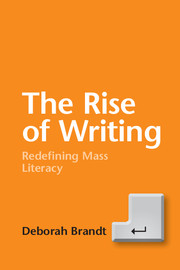2 - Writing for the State
Published online by Cambridge University Press: 05 January 2015
Summary
Asked about the voice he uses in the writing he does at work, a long-time policy analyst for a government family-services bureau responded this way:
Generally I’m using the voice of whoever I consider I’m representing, whether that’s the tribes, Joe Citizen, or a family, or whoever. Ultimately things may be changed by political decisions but I work for the people. I’m a professional. If the governor or the secretary [of the agency] has a position, I could sit down and write a really good argument for their position. But that’s not my job. My job is to have them question their position, not for me to accept theirs, because if we aren’t in there making [government officials] defend positions, why are we here?
As he describes it, this analyst uses his professional workplace writing to precipitate processes of deliberation that he associates with good government. He seeks to multiply the viewpoints out of which public policy will be decided. By writing in “the voice of whoever I consider I’m representing,” this civil servant creates what he sees as a critical, productive dialogue between the governing and the governed. Unelected and without decision-making power, he nevertheless positions himself actively as a populist voice within the democratic processes of his government. Indeed, in his view, it is his professional responsibility to do so.
Other civil servants have different ideas about the professional role of their writing in the making of good government. Here is an account from another policy analyst, who works in a state department of administration, describing the approach he uses when researching and evaluating proposed legislation:
You’re looking for the best information to support [the governor’s] position. This stuff gets run through the mill quite a lot and sometimes you might think, well, the governor’s got a pretty weak position here. I can hope that the Fiscal Bureau or the legislature will point out these problems. I can hope that the governor doesn’t get his way. But my job is to make the best case for the governor’s position. I’m going to give you the best fight I can. If I’m over matched, if there are weaknesses, I’m going to hide those weaknesses and try to figure out a way to structure my game.
- Type
- Chapter
- Information
- The Rise of WritingRedefining Mass Literacy, pp. 53 - 88Publisher: Cambridge University PressPrint publication year: 2014

